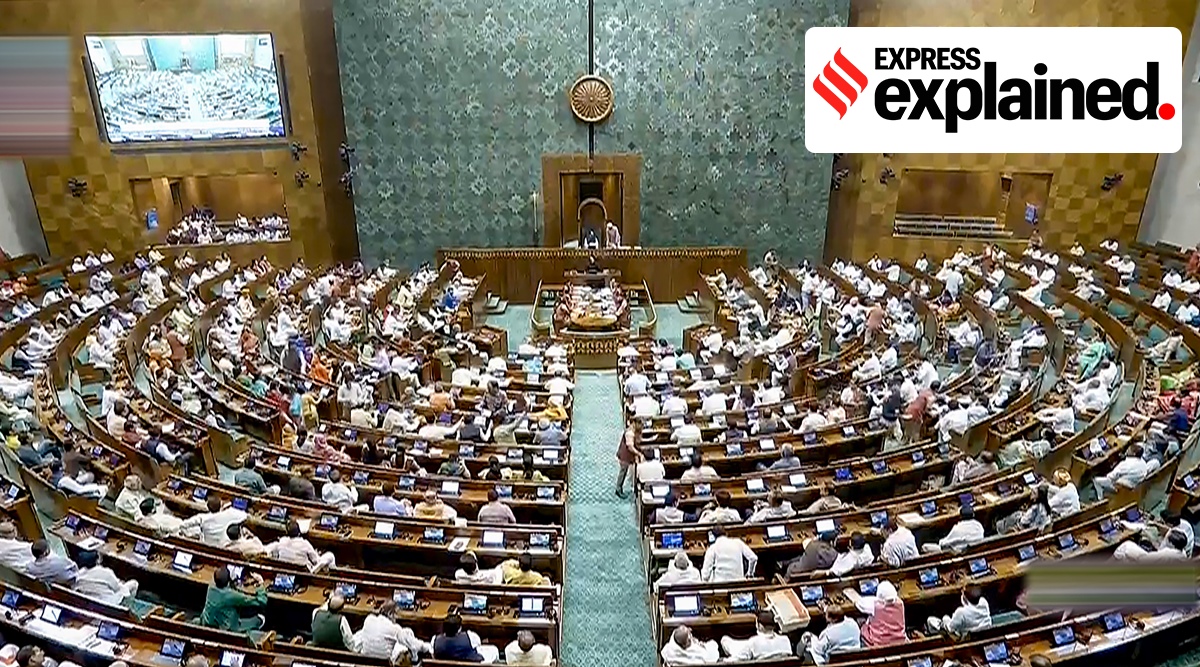As Parliament moved to a new building last week, members of Lok Sabha carried along two matters that they have kept pending for years now. In both matters, the MPs themselves are the affected party, and seek a commitment to good behaviour and proper conduct from them.

Code of Conduct
On September 15, three days before Parliament convened for the Special Session, Lok Sabha said in response to a query by The Indian Express under the Right to Information (RTI) Act: “The matter (of the Code of Conduct) is under consideration of the Committee on Ethics.”
The Committee on Ethics has in fact been considering the matter for more than eight years.
On December 16, 2014, the Lok Sabha Ethics Committee headed by Gandhinagar MP L K Advani submitted its report on proposed amendments to the Rules of Procedure and Conduct of Business in Lok Sabha to Speaker Sumitra Mahajan. The report was tabled in the House two days later.
The committee’s recommendations were included in the report of the Rules Committee of Lok Sabha, which was laid on the table of the House on August 5, 2015. The report said [the Ethics Committee] shall “formulate a Code of Conduct for Members and suggest amendments or additions to the Code of Conduct from time to time”.
It also said: “…Rajya Sabha is already maintaining a register of their Members’ interests. …The Committee recommends that the Committee on Ethics may examine and recommend the nature of Members’ interests to be declared and the form of Register of Members’ interest to be maintained for Members of Lok Sabha.”
The matter has stood there ever since.
Story continues below this ad
The Ethics Committee continued to be headed by Advani until 2018-19. Since 2019-20, it has been headed by Vinod Sonkar, the BJP MP from Kaushambi, UP.
Business interests
Asked in the same RTI application about the status of the matter concerning the declaration of the business interests of members, the Lok Sabha Secretariat provided an extract, paragraph 52A, from a publication of Parliament titled ‘Directions by the Speaker Lok Sabha’. This paragraph applies to members of Parliamentary Committees, not to all MPs.
The extract (“Personal, pecuniary or direct interest of member”) says: “(1) Where a member of a Committee has a personal, pecuniary or direct interest in any matter which is to be considered by the Committee, such member shall state one’s own interest therein to the Speaker through the Chairperson of the Committee.
“(2) After considering the matter, the Speaker shall give decision which shall be final.”
Story continues below this ad
Long-running saga
Concerns over potential conflicts of interest of MPs were first expressed almost a century ago. On January 26, 1925, it was noted in the Central Legislative Assembly that “a member having a personal, pecuniary or direct interest in a matter before the House is required, while taking part in the proceedings on the matter, to declare the nature of the interest”.
The first Ethics Committee in Lok Sabha was constituted on May 16, 2000 by the late GMC Balayogi of the TDP. Balayogi was followed as Speaker by Manohar Joshi of the Shiv Sena, Somnath Chatterjee of the CPM, Meira Kumar of the Congress, and Sumitra Mahajan and Om Birla of the BJP.
The Ethics Committee is reconstituted every year. The committee was headed by T R Baalu of the DMK in 2009-10, by Advani in 2011-12, and by Dr Chinta Mohan of the Congress in 2013-14, according to the Lok Sabha website.
Story continues below this ad
The Lok Sabha website states that the Ethics Committee shall “(a) Examine every complaint relating to unethical conduct of a member of Lok Sabha referred to it by the Speaker and make such recommendations as it may deem fit. (b) formulate a Code of Conduct for members and suggest amendments or additions to the Code of Conduct from time to time.”
After the Ethics Committee’s report is tabled in the House, it is taken up for discussion. Once approved by the House, it goes to the Rules Committee, which drafts Rules based on the recommendation.
Before the report under Advani that became part of the Rules Committee report tabled in 2015, the Ethics Committee headed by Manikrao H Gavit of the Congress had recommended on December 13, 2012: “…The Committee gave in principle approval for adoption of the Rajya Sabha model of Register of Members’ Interest. The Secretariat was accordingly directed to prepare a draft report on the subject.”
RS leading the way
Story continues below this ad
The first Ethics Committee in Rajya Sabha was inaugurated by Chairman K R Narayanan on May 30, 1997 “to oversee the moral and ethical conduct of the Members and to examine the cases referred to it with reference to ethical and other misconduct of Members”.
The Fourth Report of the Committee was adopted by Rajya Sabha on April 20, 2005, and a 14-point Code of Conduct for members of the House has been in force ever since. It says:
“…If Members find that there is a conflict between their personal interests and the public trust which they hold, they should resolve such a conflict in a manner that their private interests are subordinated to the duty of their public office;
“Members should always see that their private financial interests and those of the members of their immediate family do not come in conflict with the public interest and if any such conflict ever arises, they should try to resolve such a conflict in a manner that the public interest is not jeopardised;
Story continues below this ad
“Members should never expect or accept any fee, remuneration or benefit for a vote given or not given by them on the floor of the House, for introducing a Bill, for moving a resolution or desisting from moving a resolution, putting a question or abstaining from asking a question or participating in the deliberations of the House or a Parliamentary Committee.”
Rule 293 of the Rules of Procedure and Conduct of Business in the Council of States (Rajya Sabha) states: “There shall be maintained a ‘Register of Member’s Interests’ in such form as may be determined by the [Ethics] Committee which shall be available to members for inspection on request.” This is accessible to ordinary citizens under the RTI Act.








































